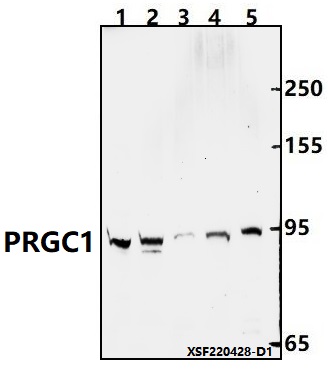Product Name :
PRGC1 (T56) polyclonal antibody Background :
PPARγ coactivator-1α (PGC-1α) was originally identified as a transcriptional coactivator whose expression closely correlated with adaptive thermogenesis following exposure to cold temperatures. Named for its association with the nuclear receptor peroxisome-proliferator activated receptor (PPARγ), PGC-1α interacts with a diverse array of transcription factors to regulate numerous aspects of cell physiology. PGC-1α helps to regulate cell processes important in adaptive thermogenesis and energy metabolism, including the related functions of glucose uptake, gluconeogenesis, insulin secretion, and mitochondrial biogenesis. Long thought to be a potential therapeutic target for the treatment of type II diabetes, obesity, cardiomyopathy, or other metabolic disorders (reviewed in 4), a recent functional survey found no obvious differences in PPARγ activity associated with recognized PGC-1α variants. Product :
Rabbit IgG, 1mg/ml in PBS with 0.02% sodium azide, 50% glycerol, pH7.2. Storage&Stability :
Store at 4°C short term. Aliquot and store at -20°C long term. Avoid freeze-thaw cycles. Specificity :
PRGC1 (T56) polyclonal antibody detects endogenous levels of PRGC1 protein. Immunogen :
Synthetic peptide, corresponding to Human PRGC1. Conjugate :
Unconjugated Modification :
Unmodification
PRGC1 (T56) polyclonal antibody Background :
PPARγ coactivator-1α (PGC-1α) was originally identified as a transcriptional coactivator whose expression closely correlated with adaptive thermogenesis following exposure to cold temperatures. Named for its association with the nuclear receptor peroxisome-proliferator activated receptor (PPARγ), PGC-1α interacts with a diverse array of transcription factors to regulate numerous aspects of cell physiology. PGC-1α helps to regulate cell processes important in adaptive thermogenesis and energy metabolism, including the related functions of glucose uptake, gluconeogenesis, insulin secretion, and mitochondrial biogenesis. Long thought to be a potential therapeutic target for the treatment of type II diabetes, obesity, cardiomyopathy, or other metabolic disorders (reviewed in 4), a recent functional survey found no obvious differences in PPARγ activity associated with recognized PGC-1α variants. Product :
Rabbit IgG, 1mg/ml in PBS with 0.02% sodium azide, 50% glycerol, pH7.2. Storage&Stability :
Store at 4°C short term. Aliquot and store at -20°C long term. Avoid freeze-thaw cycles. Specificity :
PRGC1 (T56) polyclonal antibody detects endogenous levels of PRGC1 protein. Immunogen :
Synthetic peptide, corresponding to Human PRGC1. Conjugate :
Unconjugated Modification :
Unmodification
-
 Western blot (WB) analysis of PRGC1 (T56) polyclonal antibody at 1:1000 dilution Lane1:PC12 whole cell lysate(40ug) Lane2:BV2 whole cell lysate(40ug) Lane3:THP-1 whole cell lysate(40ug) Lane4:Hela whole cell lysate(40ug) Lane5:HepG2 whole cell lysate(20ug)
Western blot (WB) analysis of PRGC1 (T56) polyclonal antibody at 1:1000 dilution Lane1:PC12 whole cell lysate(40ug) Lane2:BV2 whole cell lysate(40ug) Lane3:THP-1 whole cell lysate(40ug) Lane4:Hela whole cell lysate(40ug) Lane5:HepG2 whole cell lysate(20ug)
Bioworld Biotech only provide peptides for our antibodies and do not provide additional peptide customization services.
Price/Size :
USD 368/1mg/vial
Tips:
For phospho antibody, we provide phospho peptide(0.5mg) and non-phospho peptide(0.5mg).Describe :
Blocking peptides are peptides that bind specifically to the target antibody and block antibody binding. These peptide usually contains the epitope recognized by the antibody. Antibodies bound to the blocking peptide no longer bind to the epitope on the target protein. This mechanism is useful when non-specific binding is an issue, for example, in Western blotting (WB) and Immunohistochemistry (IHC). By comparing the staining from the blocked antibody versus the antibody alone, one can see which staining is specific; Specific binding will be absent from the western blot or IHC performed with the neutralized antibody.Formula:
Synthetic peptide was lyophilized with 100% acetonitrile and is supplied as a powder. Reconstitute with 0.1 ml DI water for a final concentration of 10 mg/ml.The purity is >90%,tested by HPLC and MS.
Storage:
The freeze-dried powder is more stable. For short time at 2-8°C. For long term storage store at -20°C.
Note :
This product is for research use only (RUO only). Not for use in diagnostic or therapeutic procedures.
 PRGC1 (T56) polyclonal antibody
PRGC1 (T56) polyclonal antibody  Datasheet
Datasheet COA
COA MSDS
MSDS SHIP
SHIP